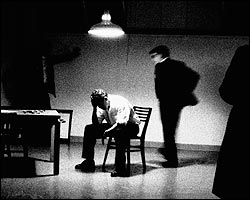
Interpretation in the legal field is considered within the types of interpretation known as “social” or “community” and is one of the aspects of interpretation that people know very little about. When talking about interpretation in police services, we use a generic meaning, including the Security Forces and Agencies of the State.
Though this type of interpretation is one of the oldest, still very little is widely known about it. In general, people don’t think about that when foreigners who do not speak the local language are stopped by the police, they need someone to act as an intermediary between them and the police. Normally an interpreter is the person who enables communication between a police officer and a foreigner who is suspected of committing a crime or has witnessed a crime.
Though the interpreter’s work is often quite important, according to the complaint filed by the judges, Asetrad uses unqualified people for the job. Truth be told, I know a person from Belgium who worked as an interpreter in a police station in the province of Málaga in the Spanish-French language pair. Of course, she did not have any specialized training or studies in the field, but she allowed the local police department to save money since they didn’t have to hire a professional interpreter whose fees would have been much higher.
Also, I recently worked on a transcription of a witness statement given by a Cuban national to an American police officer. No professional was used in this case either and the statement was filled with misunderstandings and constant repetitions by both of them just so that they could establish a simple basis for communication. The entire process would have been much easier had a professional interpreter been used.
We need to put the days when one prisoner interprets for another or, in cases of domestic violence, the abuser is the one who is filtering the content in the abusee’s native tongue for the authorities, which easily leads to omissions or interpretations that cast doubt over the entire proceeding.
The importance of this job, closely related to legal interpretations but not thought of on the same level, must be considered by everyone. This interpretation service must be of the highest quality, professional, and impartial. Professionals must be used and be compensated in relation to their training and performance, which all works towards ensuring the inherent rights of any person who is suspected of committing or who has witnessed a crime.
(Spanish version: La interpretación en los ámbitos policiales)
